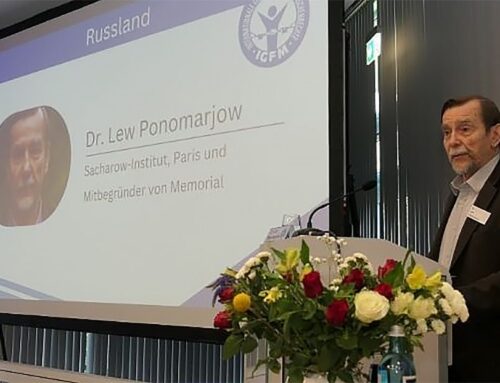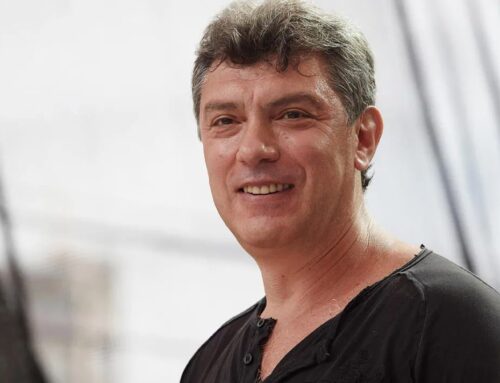The St. Petersburg-based public human rights organisation Civic Control has issued a report on the persecution of Russians under articles of the Criminal Code that have become a tool of repression for their anti-war stance.

Moscow City Duma deputy Alexei Gorinov in court on charges of ‘spreading deliberately false information about the Russian army’. Moscow, 8 July 2022. REUTERS – Stringer
A week after the start of the full-scale invasion of Ukraine in February 2022, authorities in Russia introduced military censorship laws. Under these laws, any public expression of protest against the war in Ukraine could result in criminal prosecution. Two years later, many are already serving long prison sentences for peaceful anti-war resistance.
According to the report, the increased rate of convictions under anti-war articles reflects an intensified repressive policy.
Two years after the military censorship laws were passed, people in Russia continue to protest against the war in Ukraine. However, Russian authorities intend to completely eradicate dissent in the country. In 2023, the number of convictions and the length of prison sentences for anti-war posts on social media rose sharply. In 2024, a new law was passed allowing the confiscation of property of people charged under military censorship laws.
In its report, the St. Petersburg-based public human rights organisation ‘Civic Control’ presented a picture of court proceedings in cases involving criminal prosecution for anti-war statements. The monitoring covered 129 court hearings in 17 cases in Moscow, the Moscow region, St. Petersburg and Rostov-on-Don. The main focus was on cases brought under Articles 207.3 and 280.3 of the Russian Criminal Code, introduced in March 2022, and specifically aimed at prosecuting citizens for criticising the war.
Article 207.3 deals with the dissemination of ‘knowingly false information’ about the use of the armed forces, Article 280.3, deals with ‘discrediting’ the actions of the army. These laws violate international standards on freedom of expression and allow for the criminalisation of expression, the organisation points out.
In addition to these articles, the monitoring included cases under articles on hooliganism, vandalism, treason and other offences used to prosecute anti-war activists. These cases include both public statements and actions, such as performances or protests.
Trial results
As indicated by Civic Control, the number of convictions under Articles 207.3 and 280.3 of the Russian Criminal Code increased significantly in 2023 compared to 2022, reflecting an increased repressive policy against anti-war speech.
Article 207.3 of the Criminal Code (knowingly false information about the use of the RF Armed Forces):
14 people are convicted in 2022; in 2023 there are already 59 convicted. This is more than a fourfold increase.
Article 280.3 of the RF Criminal Code (discrediting the use of the RF Armed Forces):
In 2022, 2 people are convicted, in 2023 – 46. The increase was 23 times.
The organization also notes that the sentences handed down by the courts have become more severe:
In 2023, the number of custodial sentences increased, especially under Part 2 of Article 207.3 of the Criminal Code (28 cases against 2 in 2022). Under Article 280.3, the number of real terms of imprisonment also increased: 7 custodial sentences in 2023 against 0 in 2022.
These data indicate the increased pressure on citizens for criticising the war and actions of the army, as well as the growing severity of judicial practice.
All cases included in the monitoring resulted in convictions. The minimum punishment was 10 months of imprisonment in a penal colony, the maximum – 25 years of strict regime for Vladimir Kara-Murza. Despite the release of Kara-Murza and a number of other defendants as a result of the prisoner exchange in August 2024, the severity of punishments and procedural violations indicate the repressive nature of the judicial system.
Violations of international standards of justice
The monitoring of ‘Civic Control’ revealed numerous violations of the principle of fair trial: partiality of judges, inequality of the defence and prosecution, restriction of lawyers’ rights, as well as non-transparency of the trials themselves. In particular, complaints of defendants about pressure and irregularities in the process were ignored. Judges more often granted prosecution motions and were critical of defence evidence. Difficulties with access to defendants in pre-trial detention facilities and poor quality of video links worsened the opportunities for their defence. Decisions to close trials were taken without explanation, undermining the principle of publicity. Often information about hearings was not published on court websites, and public access was restricted in various ways.
Anti-war speech trials in Russia are accompanied by systematic human rights violations. Those convicted, according to observers, are political prisoners held accountable for exercising the legal rights to freedom of speech and assembly. The severity of punishments and violations of justice standards confirm the repressive nature of legislation and judicial practice.
Documenting such cases is important to draw the attention of the international community to the problem and to protect the rights of citizens persecuted for their beliefs. UN experts and Russian human rights organisations consider people prosecuted for anti-war statements as political prisoners and demand their release.
Source: rfi.fr








Leave A Comment